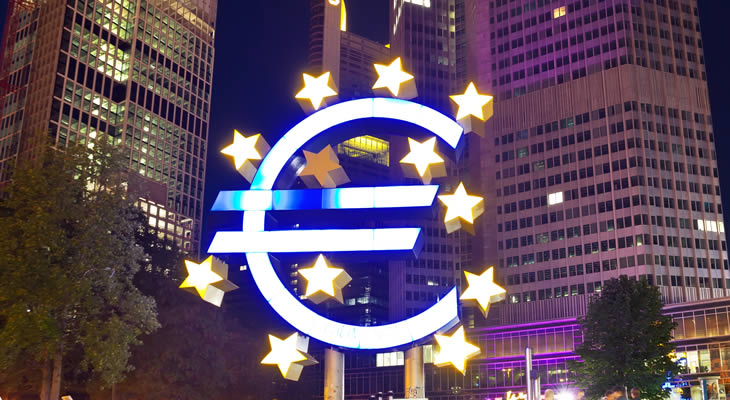Pound to Euro Exchange Rate Still Near Worst Levels despite European Central Bank Speculation
Despite today’s Eurozone data falling short of expectations and leading to further speculation about how soon the European Central Bank (ECB) could ease monetary policy, the Pound Sterling to Euro (GBP/EUR) exchange rate has still been trending relatively closely to its worst levels.
GBP/EUR has been floundering in recent weeks as no-deal Brexit jitters keep Sterling from recovering too far from near its worst levels. The pair slipped slightly last week and could be in for yet another week of modest losses.
Since opening this week at the level of 1.1167, GBP/EUR briefly spiked higher before tumbling.
While still not falling to last week’s post-January low of 1.1127, the pair hasn’t been trending much higher than those lows. At the time of writing, GBP/EUR trended closely to the level of 1.1143.
Investors have been hesitant to buy the Pound (GBP) as fears of a no-deal Brexit being possible dominate the British currency’s outlook.
This has prevented it from a solid recovery against the Euro (EUR), even as the latest Eurozone data disappoints and causes ECB stimulus bets to rise.
Pound (GBP) Exchange Rates Lack Drive to Recover despite Weak Rivals
The Pound continues to trend relatively closely to its worst levels in months against the Euro despite the Euro’s own weakness this week. This is because markets simply have very little reason to buy the Pound.
Concerns that the Brexit outlook could worsen and continue to weaken Britain’s economic outlook as well are keeping heavy pressure on Sterling, and making it difficult for the British currency to enjoy any respite.
Despite warnings from UK Prime Minister Theresa May about the potential damage a no-deal Brexit could cause, potential successors Boris Johnson and Jeremy Hunt have both indicated that a no-deal outcome is highly possible.
Due to a combination of no-deal Brexit fears, as well as this week’s UK PMI stats coming in well below expectations, fears that Britain’s economy could contract in Q2 and maybe Q3 as well have let to Bank of England (BoE) interest rate cuts.
The bank has continued to indicate that rate hikes are more likely than cuts over the coming years, but analysts have expressed doubt due to poor UK data, and rate cut bets have risen as a result.
Euro (EUR) Exchange Rates Struggle to Advance as Eurozone Retail Sales Disappoint
The Euro has been able to sustain some gains against the Pound this week, despite numerous factors weighing heavily on the shared currency in recent sessions.
At the beginning of the week, the Euro was weaker as its rival the US Dollar (USD) saw a rebound in demand, and since then the Euro’s potential for gains has been limited by European Central Bank (ECB) speculation.
This week has been a busy one for ECB news, but the Euro has seen little major shift in demand despite that.
Most notable was the announcement that International Monetary Fund (IMF) Chairwoman Christine Lagarde had been chosen to succeed Mario Draghi as the ECB’s President when he steps down later this year.
Lagarde is seen to be a continuity candidate who will not stray too far from the tone Draghi took during his tenure. The Euro’s lack of major movement in response to the news was seen as a sign that markets were confident with the decision.
Today’s Eurozone retail sales did leave the Euro a little less appealing though, as the figures fell short of forecasts and caused bets to rise that the ECB was more likely to introduce softer monetary policy soon.
Pound to Euro (GBP/EUR) Exchange Rate Outlook Depends on Political and Central Bank Developments
With both the Pound and the Euro seeing limp, mixed movement this week, Pound to Euro (GBP/EUR) investors are looking ahead to potential political and economic news that could influence the pair.
If no-deal Brexit fears lighten at all on UK political developments in the coming days, it could be just the boost the Pound needs to mount a recovery against the Euro, which is also highly weak.
Any signs that Britain’s next Prime Minister will do more to avoid a no-deal outcome would be potentially supportive.
GBP/EUR may also advance if Eurozone data continues to disappoint and lead to further weakness in the Euro.
Tomorrow will see the publication of German factory orders and French trade balance data from May. If these stats disappoint as well, European Central Bank (ECB) interest rate cut bets are more likely to rise and the Euro would weaken.
Pound to Euro (GBP/EUR) exchange rate investors are also likely to focus heavily on next week’s major upcoming data, including German trade balance and inflation data.


Comments are closed.